Five talking points from Ghent-Wevelgem 2020
The first of cobbled Classics did not disappoint
A thrilling return of the cobbled Classics
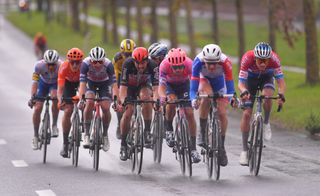
There’s a lot going on in the cycling world at the moment, what with the Giro d’Italia now approaching its second week, but two thrilling editions of Ghent-Wevelgem today reminded us of just how unmissable the cobbled Classics are.
Both the men’s and women’s races threw up relentless excitement. The men’s race ignited early on as the likes of Mathieu van der Poel (Alpecin-Fenix) accelerated with 70km still to ride, and continued in that fashion throughout, right up until the final kilometres where the leading group continued to attack each other.
The women’s race started in a similar fashion, with the key selections being made just as early on, and then developed into a tense pursuit between a leading group and a chasing peloton featuring sprinters like Lorena Wiebes itching for a chance to sprint for victory.
The weather played its part, too. The cold and the wind made for tough, hardy racing, while rain made the so-called ‘Plugstreets’ dirt roads into wet mud baths that were almost impossible to negotiate.
It might be October rather than the spring, and the cancellation of Paris-Roubaix may make it a truncated affair, but this brief season of cobbled Classics will be worth the wait if it continues in this manner — with next weekend’s Tour of Flanders likely to be the highlight.
Mads Pedersen rides like a world champion
Get The Leadout Newsletter
The latest race content, interviews, features, reviews and expert buying guides, direct to your inbox!
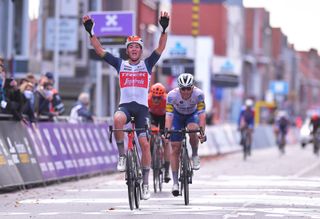
Mads Pedersen (Trek-Segafredo) was supposed to ride the Classics last spring resplendent in the rainbow jersey. The cobbles are where he really excels, and he must have been looking forward to showing what he could do as world champion having won the rainy road race in Yorkshire last year.
>>> Mads Pedersen takes victory in hard-fought Ghent-Wevelgem 2020
However, the rejigged season means that the majority of the cobbled classics are only taking place now, in October, since when Pedersen has had to hand over the jersey to the new champion, Julian Alaphilippe (Deceuninck-Quick-Step).
Today showed just how much he would have honoured the rainbow jersey in the Classics were he given the chance. He rode well early on, and got himself into a strong lead group with 60km still to ride, and, in the final kilometres, was alert to the danger when the other favourites looked at each other as the trio of Florian Sénéchal (Deceuninck-Quick-Step), Matteo Trentin (CCC) and Alberto Bettiol (EF Pro Cycling).
He made a significant effort to bridge up to them on his own, but still had enough left in the tank to beat them all in the sprint. It was a fine display of the mixture of strength, tactical smarts, resistance to inclement weather and quick sprint that makes Pedersen such a quality rider for the classics.
Van der Poel and Van Aert cancel each other out
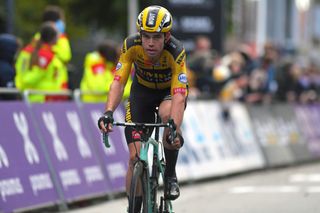
The men’s race was billed as the first major battle between Wout van Aert (Jumbo-Visma) and Mathieu van der Poel (Alpecin-Fenix), and the two didn’t disappoint — even if they only managed to finish eighth and ninth respectively.
For much of the race, they looked like the strongest riders. Van der Poel exploded the peloton into pieces with accelerations during the crucial flurry of cobbled climbs and plugstreet dirt roads that come before the lengthy flat run-in to the finish, and the two rode side-by-side up the final ascent of Kemmelberg, apparently inseparable.
>>> Wout van Aert: 'Van der Poel would rather that I lost than he won'
Indeed, they continued to be evenly-matched in the race’s finale, which proved to be detrimental to both their chances. Aware that the other was their main rival for victory, they effectively cancelled each other out, with Van der Poel using up all his energy to neutralise Van Aert’s attack, and neither subsequently managing to follow the decisive race-winning move.
“There was one rider who didn’t want to win and was only looking at me,” said a frustrated Van Aert at the end. “Yes, it was Mathieu van der Poel. Apparently he would rather I lost than he won himself.”
There evidently remains some needle in their rivalry, which sets next week’s Tour of Flanders up fascinatingly.
Jolien D'hoore back to winning ways
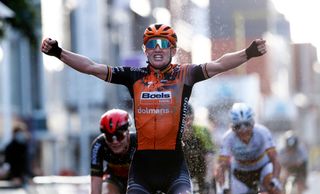
It’s been a while since we last saw the best of Jolien D'hoore. Since lockdown she’s abandoned the Giro Rosa and finished outside of time limit at La Course, while she’s been without a victory at elite level win in Oxfordshire at last year’s Women’s Tour.
Today, however, she was back to her very best, and reminded everyone of just what a formidable opponent she is when on-form.
>>> Jolien D'hoore wins a thrilling edition of Ghent-Wevelgem women's race
It wasn’t just her sprint, which she timed perfectly to defeat Lotte Kopecky (Lotto-Soudal), that impressed. It was the fact that she managed to make it into the lead group, despite the severity of the climbing the riders had to contest with, was a real show of strength, especially as other sprint specialists such as Lorena Wiebes (Sunweb) were left adrift.
This is D'hoore’s first win at Ghent-Wevelgem of her career, having previously finished second in both 2018 and 2017, and on this form she looks a very good shout for the Tour of Flanders too.
Numerical advantages don’t quite translate into victory
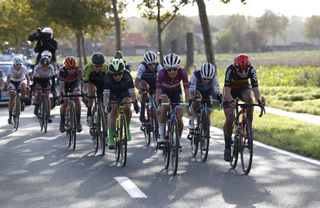
Both the men’s and women’s races of Ghent-Wevelgem demonstrated how individual ability can trump team strength, even in the complex tactical circumstances of the spring Classics.
As they so often do, Deceuninck-Quick-Step boasted the most numbers in the finale of the men’s race, with Florian Sénéchal, Yves Lampaert and Kasper Asgreen all part of the chasing group that caught the leading group on the final climb of the Kemmelberg.
Usually the team manage to win from such circumstances, and they employed their familiar tactics of firing riders off the front alternatively. But this time they came up just short, as Senechal couldn’t quite beat Pedersen in the sprint, having to settle for second-place instead.
In the women’s race, Trek-Segafredo also placed three riders in the lead group, but ultimately came nowhere near victory. Ellen van Dijk and Elisa Longo Borghini both made attacks to no avail, while Lizzie Deignan lacked the legs in the sprint, only managing eighth.
Having successfully achieved their target of dropping most of the main sprinters on the climbs, and then helping ensure they didn’t come back in the flat run-in to the finish, they’ll be disappointed at not being able to finish off the job, and continue their current hot winning streak.

Thank you for reading 20 articles this month* Join now for unlimited access
Enjoy your first month for just £1 / $1 / €1
*Read 5 free articles per month without a subscription

Join now for unlimited access
Try first month for just £1 / $1 / €1
Stephen Puddicombe is a freelance journalist for Cycling Weekly, who regularly contributes to our World Tour racing coverage with race reports, news stories, interviews and features. Outside of cycling, he also enjoys writing about film and TV - but you won't find much of that content embedded into his CW articles.
-
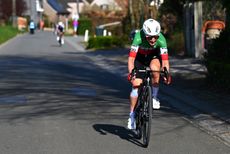 Elisa Longo Borghini emerges as Flanders favourite with Dwars door Vlaanderen victory
Elisa Longo Borghini emerges as Flanders favourite with Dwars door Vlaanderen victoryThe Italian rider soloed to her 50th career win ahead of an elite pack of chasers
By James Shrubsall Published
-
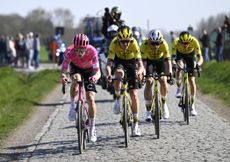 'We did a beautiful race up until 10km to go' - Visma-Lease a Bike pull defeat from the jaws of victory at Dwars door Vlaanderen
'We did a beautiful race up until 10km to go' - Visma-Lease a Bike pull defeat from the jaws of victory at Dwars door VlaanderenWith such a difficult second place on Wednesday, could this performance affect confidence ahead of the Tour of Flanders?
By Adam Becket Published